Streak of hardships plague valley farmers
|
Published: 03-17-2024 1:01 PM
Modified: 03-18-2024 6:34 PM |
Farming is already a tough field to make one’s living. Throw in three consecutive years of extreme weather and personal burnout and you’ve got a recipe for what is shaping up to another difficult year for valley farmers, as they prepare their fields this spring.
With the weather whiplash of heavy rains in 2021, a severe drought in 2022 and the deluge of rain in July 2023 — oh, and don’t forget the two, separate 2023 frost events that killed peaches and other crops — some farmers are looking to rebuild, while others are taking some time off or trying to sell their businesses entirely.
In Conway, Natural Roots Farm co-owners David Fisher and Maggie Toran are looking forward to a more regular year after the South River ran over its banks in July and washed away the vast majority of their produce, which was slated to be harvested just weeks afterward for their more than 240 community-support agriculture (CSA) shares.
After losing all of their crops except for an outlying field, the farm was able to support its CSA shares through donations from other farms in the Pioneer Valley.
“There’s a lot of miracles of last year, but we basically lost all of our vegetables in week five in July. By the generosity of the farming community we were able to run essentially an entire season; it’s amazing,” Fisher said in the farm store’s new vegetable wash-and-pack room, which is funded by a grant and serves as a sign the farm is continuing to build up after a difficult year.
While the farm is building back up, challenges still remain. Despite receiving some government relief funds and raising money through a successful GoFundMe campaign, there is still expensive riverbank stabilization work to be done and CSA shares have slowed down this season compared to others.
Toran said the farm typically has about 240 shares each season, but this year the number is down to about 200 thus far and they are in need of about 40 full shares — the farm offers half-season and full-season shares — to meet their goal.
“It’s a large percentage of our budget. CSA is our business,” Toran said. “We are a community farm and that is part of the vibrancy of this place and we’re just really looking forward to having people back here.”
Article continues after...
Yesterday's Most Read Articles
“The CSA model works so well for us and we’ve got all the systems in place and everything works,” Fisher added. “If we weren’t able to fill out memberships, do we find other markets or do more wholesaling? It’s a whole other enterprise that we’d have to develop on the fly.”
For other farmers, like Simple Gifts Farm co-owners Jeremy Barker Plotkin and Dave Tepfer, the weather may have been a factor, but it is not the only reason they’re stepping back from owning a farm.
Barker Plotkin and Tepfer recently announced they were closing down most operations, including the farm store, at Simple Gifts Farm, which is based in North Amherst, as they were unable to find a buyer for the farm. The farm began operating in 2006.
“I don’t think that we’re only closing down because of a couple tough years … but for sure, part of the reason we’re moving on is it’s always been difficult making a living with what we do; we’ve been doing it because we love it,” Barker Plotkin said. “You have to be the HR department, you have to be the mechanic, there’s so many different skills.”
The “diverse” list of skills needed to run a successful farm make it a joy to go to work, but Barker Plotkin said it is becoming quite difficult as he and his business partner are getting older and the physical aspects of the job continue to take their toll, while also managing so many other aspects of being an employer and owner.
Both men have new jobs lined up, with Tepfer joining All Farmers, an Agawam-based organization supporting refugee and immigrant farmers, and Barker Plotkin joining the American Farmland Trust. In the meantime, Simple Gifts Farm is still up for sale and Barker Plotkin sees a bright future for the “well-loved piece of land.”
“I think the farm is going to be a farm again. We’ve built some good infrastructure and it’s in a good location,” he said, noting that support for the farm over the years has been strong. “The land was bought with some state and federal funding and town funding and people chipping in with contributions. We’ve been very grateful for the support that we’ve had; I wouldn’t go back and decide not to do it.”
Barker Plotkin and Tepfer are not alone either. In neighboring Hadley, Next Barn Over Farm is taking a year sabbatical, as owner Ray Young wrote in their newsletter that after 19 straight years of farming — 14 as owner and operator of the farm — they have “come to the realization that I truly need a break.” Young was unable to find an alternative manager for the 2024 season.
“To those of you who had planned to join us again this season, please consider joining another one of the awesome CSAs in our region, and continuing to support local agriculture by shopping at co-ops and farmers markets,” Young wrote. “I want to send out a huge and heartfelt thank you to all of you for your continued support. Many of you have been with us for a very long time and I know that not having our CSA this season will be sad and difficult for some. Thank you for your understanding and your support even through this break.”
In a similar, but not quite the same, situation, the longtime owners of Kitchen Garden Farm in Sunderland, Caroline Pam and Tim Wilcox are also leaving farming, for now. The couple who have grown their business into a 65-acre farm are selling it to two longtime employees, while they determine their next steps.
The community support the other farmers brought up, Toran and Fisher said, is essential to farms — and any other small, local businesses — especially as they navigate turbulent weather and financial times.
“We’re looking at the lay of the land for small farms in our community and noticing hardship and transition,” Toran said. “We’re wanting the larger community to be aware of what’s happening … and not taking something for granted.”
Even if farmers avoided the weather troubles of the last few seasons and they still have the energy to keep farming, catastrophe can still strike, as seen by two high-profile farm fires in Franklin and Hampshire counties in the last six months.
On Sept. 10, Hager’s Farm in Colrain lost its main barn, 39 animals and a wide variety of equipment in a morning fire, while the longtime farming family was preparing for their day at the Franklin County Fair. The family also lost their entire stock of Pioneer Valley Popcorn, tractors, a baler and countless other tools. Colrain firefighters were credited by the Hagers for their efforts in saving family pets and spraying their home down with protective foam, which likely saved the house standing just yards away from the structure.
This year, Red Fire Farm in Granby experienced an estimated $1 million in damages stemming from a fire that destroyed a century-old barn, which contained signs, tools, potting soil, irrigation equipment, pallets, display coolers and other equipment, as well as produce and frozen goods. Much like in the Hagers’ case, though, first responders were able to prevent the fire’s spread and save the farm’s fields, tractor sheds, garage and farmhouse, while ensuring nobody was injured.
“It hasn’t been easy for farmers,” Red Fire Farm co-owner Ryan Voiland said in an interview after the fire, adding, through tears, that this was “the last thing we need.”
Despite the compounding challenges of severe weather and the fire, Ryan and Sarah Voiland were adamant they were going to keep charging forward in an update post on the farm’s GoFundMe page. The GoFundMe campaign can be accessed at bit.ly/4ackAot.
“We are a little over a week out from our worst day ever as farmers. If you told me that in about a week’s time we would have heard from over 1,400 people with offers of help and donations to support our farm, I wouldn’t have believed it. Yet here we are. Thank you to each of you. Your kindness and support is holding us up and keeping us moving,” the Voilands wrote. “This farm has never been just for our family, it’s for all of you, all of us. Thank you for making that come true over all of these years. And thank you for sticking with us in our time of challenge.”
Chris Larabee can be reached at clarabee@recorder.com or 413-930-4081.

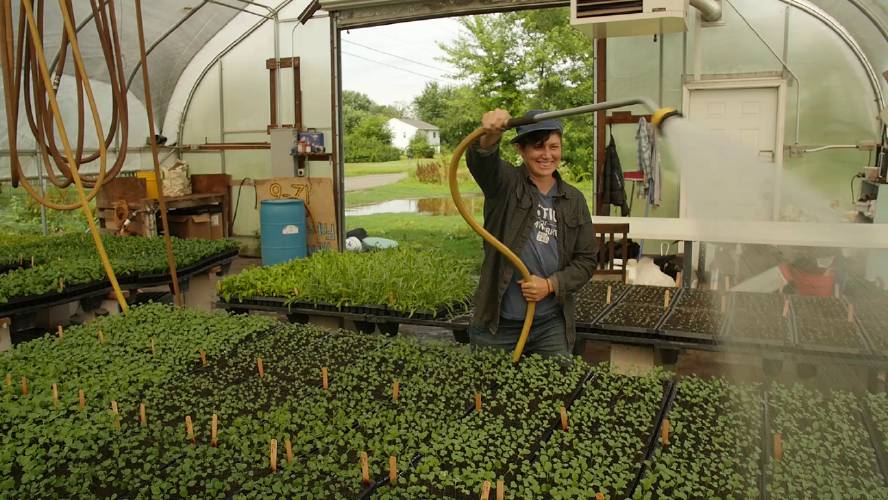
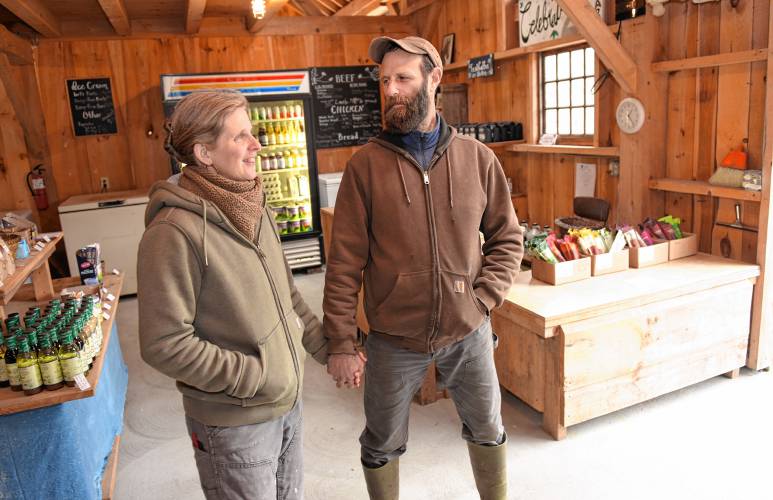
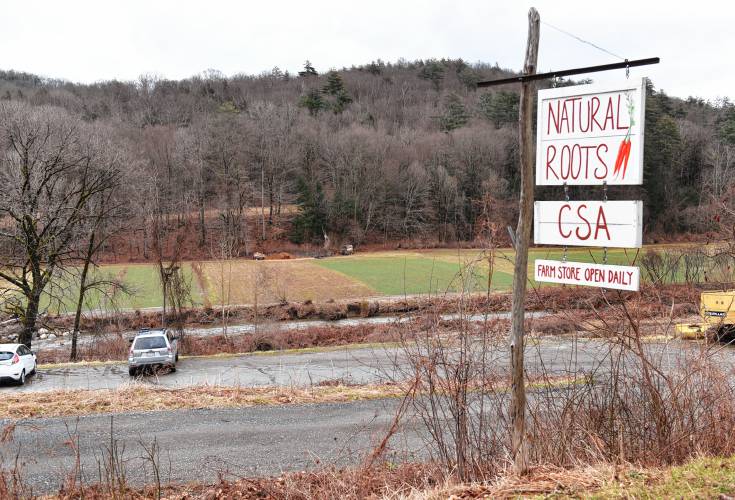
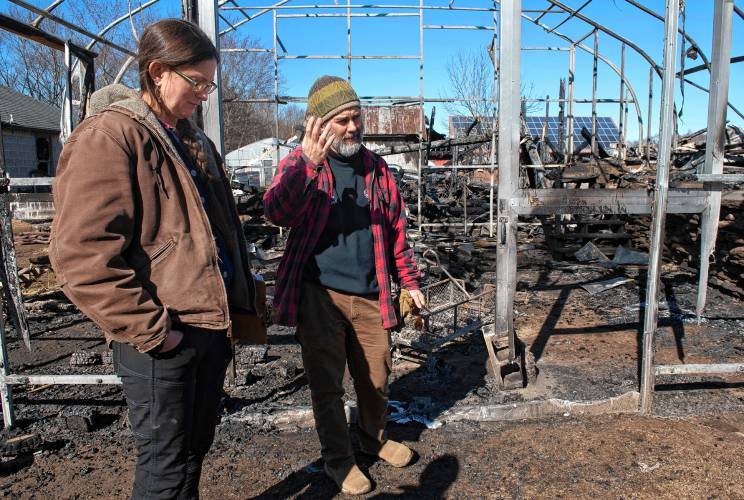
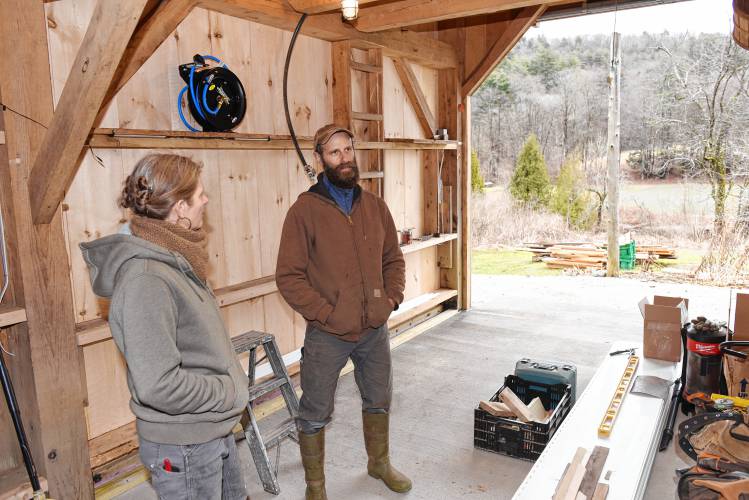
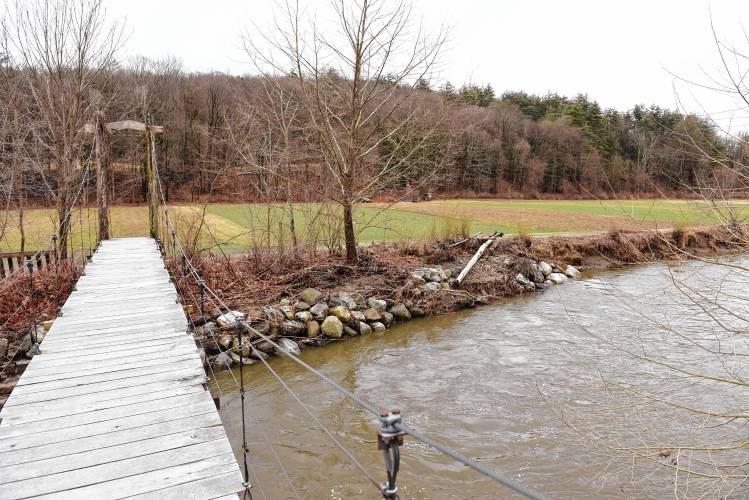
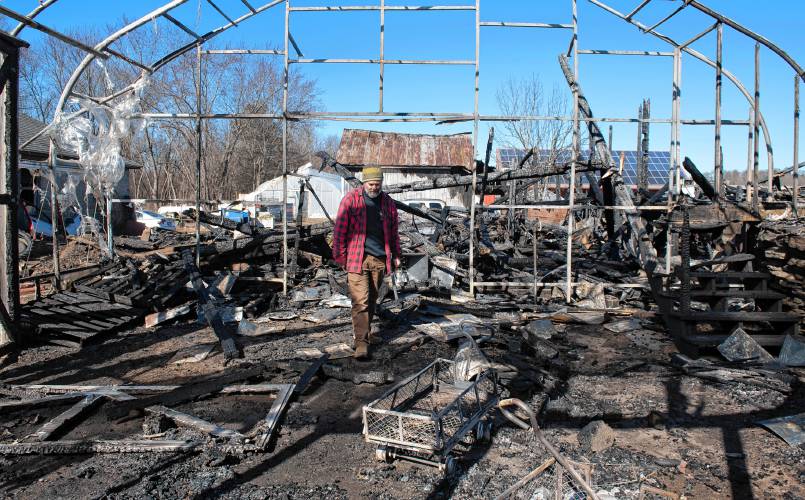
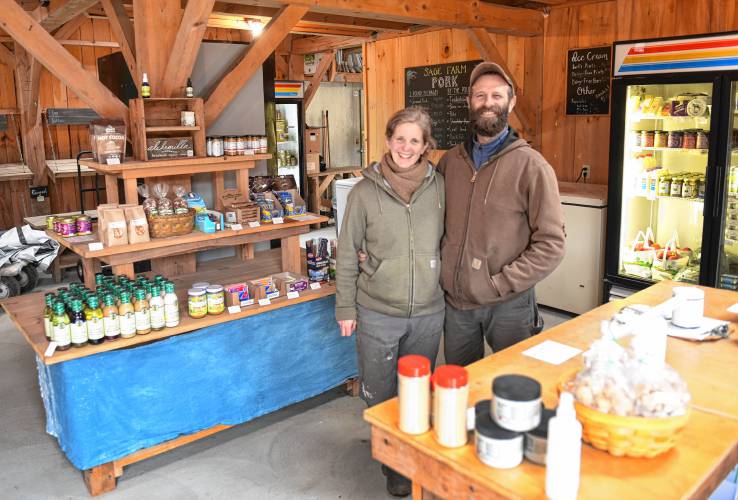
 Authorities ID victim in Greenfield slaying
Authorities ID victim in Greenfield slaying  Federal probe targets UMass response to anti-Arab incidents
Federal probe targets UMass response to anti-Arab incidents Locking up carbon for good: Easthampton inventor’s CO2 removal system turns biomass into biochar
Locking up carbon for good: Easthampton inventor’s CO2 removal system turns biomass into biochar William Strickland, a longtime civil rights activist, scholar and friend of Malcolm X, has died
William Strickland, a longtime civil rights activist, scholar and friend of Malcolm X, has died
